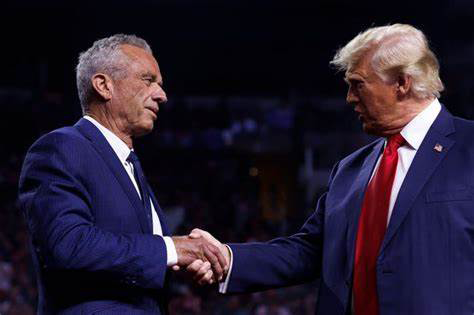
Washington, D.C., 2024 – In a pivotal move that is already generating substantial conversation across the nation, President-elect Donald Trump has announced the nomination of Robert F. Kennedy Jr. to serve as the Secretary of Health and Human Services (HHS). This major appointment, disclosed on Thursday, marks a significant addition to Trump’s Cabinet just days after his election victory, signaling a clear shift in the future direction of U.S. health policy.
Robert F. Kennedy Jr., who initially pursued the Democratic presidential nomination before running as an independent candidate, later endorsed Trump, making his alignment with the administration a noteworthy development. Known for his outspokenness on a range of public health issues, Kennedy has frequently been at the forefront of health debates, raising questions about vaccine efficacy and calling for changes to current public health practices, including the removal of fluoride from municipal water supplies. His appointment to lead the Department of Health and Human Services places him in charge of an expansive network of health agencies, including the National Institutes of Health (NIH) and the Centers for Disease Control and Prevention (CDC).
As Secretary of HHS, Kennedy will be tasked with overseeing 13 public health agencies and the implementation of federal health programs that affect millions of Americans. Kennedy has previously been vocal about reassessing infectious disease research at the NIH and has hinted at re-evaluating other programs critical to the nation’s health. His history of skepticism toward vaccine mandates and his critique of federal health regulations suggest that sweeping changes may be on the horizon for key agencies under the HHS umbrella.
The nomination has triggered widespread discussion among both the public and professionals in the healthcare sector, with reactions ranging from enthusiasm for the potential of reform to concern over Kennedy’s past controversial positions. His stance on vaccines has drawn significant attention, and questions have been raised about how his views will influence federal health policy—particularly in light of recent infectious disease challenges and the ongoing efforts to ensure vaccine coverage across the country.
However, Kennedy’s commitment to “restoring scientific research standards, transparency, and public trust” within federal health institutions, as noted by President-elect Trump, suggests that his role will involve recalibrating the public’s confidence in health agencies and their work. The emphasis on transparency and accountability may appeal to those who have become increasingly skeptical of the federal government’s handling of public health matters in recent years.
Kennedy’s nomination comes at a time when the U.S. healthcare system is at a crossroads, with debates surrounding public health priorities, the handling of emerging infectious diseases, and the federal government’s role in managing health crises taking center stage. His unconventional approach to health issues—often challenging long-standing policies and advocating for alternative perspectives—will undoubtedly bring about a shift in how public health and safety measures are crafted and implemented.
Observers believe Kennedy’s leadership could see a dramatic overhaul in the priorities of HHS, including a potential reduction in bureaucratic obstacles that impede scientific inquiry and the implementation of policies promoting personal freedom over federal health mandates. Supporters of Kennedy’s appointment believe that this could pave the way for renewed scrutiny of existing health regulations and a shift toward policies that emphasize individual health choices and less federal intervention.
For the health agencies under his leadership, including the NIH and CDC, Kennedy’s tenure could mean re-evaluations of key research programs and a refocusing of funding to align more closely with the administration’s vision for health autonomy and consumer rights. His vocal opposition to certain health initiatives—combined with an endorsement from President-elect Trump for a health strategy that promises to respect scientific inquiry while enhancing transparency—suggests an imminent reimagining of how these agencies interact with both policymakers and the American public.
The HHS nomination also brings to the forefront Kennedy’s interest in addressing the often overlooked aspects of public health, such as environmental impacts on wellness, the role of nutrition, and preventive health initiatives. Advocates for holistic and preventive health measures see his leadership as a possible opening to shift more resources into exploring the root causes of diseases rather than merely focusing on treatments.
As the nation watches and waits, Kennedy’s nomination signals that the incoming administration is prepared to challenge conventional practices within the federal health system and to redefine the approach to public well-being. His commitment to elevating standards of scientific research, encouraging more transparency, and addressing the concerns of skeptical citizens aligns closely with the broader themes that President-elect Trump emphasized throughout his campaign—accountability, reform, and a promise to listen to voices long ignored.
The nomination of Robert F. Kennedy Jr. as Secretary of Health and Human Services is undoubtedly a bold decision that foreshadows a new era for American health policy. Whether it will lead to the transformative change touted by President-elect Trump remains to be seen, but one thing is certain: this appointment will reshape how health policies are discussed, implemented, and received by the American public.
The eyes of the nation—and indeed the world—are on this developing story. The decisions that unfold under Kennedy’s leadership at HHS could fundamentally alter the trajectory of U.S. healthcare, setting new precedents for transparency, individual choice, and the role of government in managing the health of its citizens. As these events continue to unfold, the conversation surrounding public health and federal oversight has never been more critical or more intensely debated. Stay tuned for more developments on this significant nomination and its implications for the health of millions of Americans.

Be First to Comment